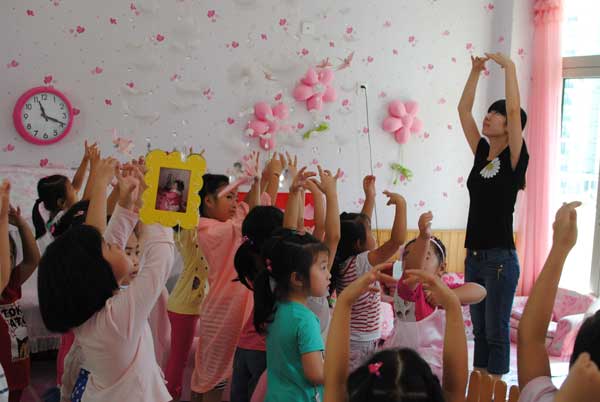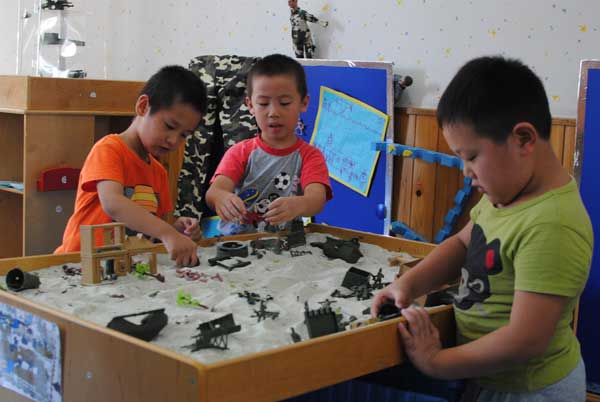

Girls at the Haoertong Kindergarten in Shanghai practice ballet under the guidance of a teacher, while the boys play war games in the 'boy's club' set up by the kindergarten to boost their masculinity.

As concern mounts over a crisis of confidence among male pupils, one kindergarten is working to help them discover their masculine side.
Ni Jieji, a 23-year-old kindergarten teacher, has seen many children screaming and wailing when they first enter school, but the unusual timidity of Xiaolei still surprised him. Ni found the 5-year-old boy seldom talked with his classmates. In class, he seemed afraid to speak. "He didn't even dare to ask to leave when he wanted to go to the toilet," Ni recalls.
Xiaolei might be an extreme case. However, Xu Hui, the principal of Haoertong Kindergarten in Shanghai's Pudong New Area, noticed that on the first day of a new school year most of the children crying are boys. Moreover, boys are slower to get integrated into the "small society" of kindergarten than girls.
The so-called "boy crisis" — the claim that boys are becoming physically weaker and emotionally more vulnerable than girls — is starting to worry Chinese teachers and parents.
To boost the masculinity of boys, the Haoertong Kindergarten has developed a gender education program, becoming the first and only kindergarten in the city to apply gender education to children as young as 5.
"We would like to introduce some of the best traits in men valued by Chinese tradition, such as bravery, the courage to overcome difficulties and the sense of responsibility," Xu said.
"For girls, we hope to cultivate their gentleness, carefulness and grace," she added.
An embodiment of the gender education program is two specially designed classrooms for boys and girls, namely the boys' club and the girls' club.
Twice a week, boys play in their club, which is equipped with mini-versions of sport facilities associated mainly with boys, such as baseball, golf, archery and car races. And there is a small sand battlefield where boys can use toy soldiers and weapons to fight a war. At the end of the half hour of activity, they practice a few gestures from kung fu, under the guidance of Ni Jieji, one of the two male teachers at Haoertong.
"When boys play with boys, they play more wildly and freely," said Ni. "The club is a catalyst."
Sports are especially emphasized in the program to boost masculinity, according to Shen Ying, chief of the kindergarten's research section, which is responsible for the gender education program.
"Compared to foreign parents who pay great attention to children's sporting abilities, Chinese parents tend to stress more on enriching children's knowledge and developing skills like drawing or playing musical instruments," Shen said.
"But sports, especially some challenging games, are a key element in shaping children's physical strength and character," she said.
The lack of manly traits in boys in big cities can be blamed on the fact that many boys are overprotected, as they are the only child in the family and their parents are also only children, Shen said.
"In many families, boys are looked after by nannies and grandparents, who are too careful to allow the boys to take risks," she said, adding that news reports about accidents involving children only make them more anxious about safety.
The absence of a father figure in families also contributes to the lack of masculinity in boys. In the case of Xiaolei, his father is always very busy and seldom picks him up in the kindergarten, said the teachers.
Cao Yanmei, a mother from Suqian in Jiangsu province, has been vigilant on the female-dominant child-rearing environment. She invited her father, who used to serve in the army, to help take care of her 4-year-old son.
"My father would not spoil the child. When my son did something mischievous, he would not yell to stop him, but would let him learn the lesson by himself," she said.
Copyright ©1999-2018
Chinanews.com. All rights reserved.
Reproduction in whole or in part without permission is prohibited.